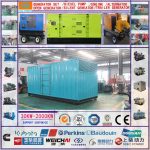Introduction:
In today's world, where electricity is an essential part of our daily lives, power outages can be a major inconvenience. Whether it's due to extreme weather conditions, equipment failure, or maintenance issues, losing power can disrupt our routines and even pose safety risks. This is where diesel generators come into play, providing a reliable source of backup power for residential use. In this comprehensive guide, we will explore the benefits, considerations, installation, maintenance, and best practices for using diesel generators in residential settings.
Benefits of Diesel Generators for Residential Use:
1. Reliability: One of the primary advantages of diesel generators is their reliability. Diesel engines are known for their durability and can run for long periods without overheating or experiencing mechanical issues. This makes diesel generators a dependable source of backup power during emergencies.
2. Fuel Efficiency: Diesel generators are more fuel-efficient than gasoline generators, providing more power output per gallon of fuel. This results in lower fuel consumption and longer run times, making diesel generators a cost-effective option for residential use.
3. Longevity: Diesel generators have a longer lifespan compared to other types of generators. With proper maintenance and care, a diesel generator can last for decades, providing reliable backup power for years to come.
4. Industrial applications of a 400kW generator : Diesel generators are capable of producing high power output, making them suitable for running multiple appliances and devices simultaneously. This is especially beneficial during extended power outages when you need to power essential appliances such as refrigerators, heaters, and lighting.
Considerations for Residential Diesel Generators:
1. Power Requirements: Before purchasing a diesel generator for residential use, it is essential to assess your power requirements. Consider the appliances and devices you need to power during an outage and choose a generator that can meet those demands.
2. Size and Portability: Diesel generators come in various sizes and configurations, so it's crucial to select one that fits your space and is easy to transport if needed. Consider the physical dimensions and weight of the generator to ensure it can be accommodated in your residential setting.
3. Noise Level: Diesel generators can be noisy during operation, so it's important to consider the noise level when selecting a generator for residential use. Look for models with noise-reducing features or consider installing soundproofing measures to minimize noise pollution.
4. Emissions: Diesel generators produce emissions that can be harmful to the environment and human health. To mitigate the impact of emissions, choose a generator that meets environmental regulations and consider investing in emission control technologies.
Installation and Maintenance of Residential Diesel Generators:
1. Location: When installing a diesel generator for residential use, choose a well-ventilated outdoor location away from windows, doors, and air intakes. Ensure that the generator is positioned on a level surface and has proper drainage to prevent water accumulation.
2. Fuel Supply: Diesel generators require a steady supply of fuel to operate effectively. Ensure that you have a sufficient fuel supply on hand and establish a refueling schedule to prevent running out of fuel during an outage.
3. Regular Maintenance: To ensure the optimal performance of your diesel generator, adhere to a regular maintenance schedule. This includes checking and changing the oil, filters, and spark plugs, as well as inspecting the fuel system, cooling system, and electrical connections.
4. Professional Service: In addition to regular maintenance, consider hiring a professional service technician to inspect and service your diesel generator periodically. Professional servicing can help identify and address potential issues before they escalate and ensure the longevity of your generator.

Best Practices for Using Diesel Generators in Residential Settings:
1. Test Run: It's important to conduct regular test runs of your diesel generator to ensure that it starts up smoothly and operates correctly. Test the generator under load to simulate real-world conditions and identify any issues that need to be addressed.
2. Emergency Preparedness: In the event of a power outage, have a contingency plan in place for using your diesel generator. Keep essential supplies such as fuel, oil, and spare parts on hand, and familiarize yourself with the operation of the generator to ensure a quick and efficient response during an emergency.
3. Safety Measures: Diesel generators produce heat, exhaust fumes, and electrical currents, so it's crucial to observe safety precautions when operating the generator. Keep flammable materials away from the generator, ensure proper ventilation, and use appropriate personal protective equipment when handling fuel and performing maintenance tasks.
4. Compliance with Regulations: Before installing and operating a diesel generator in a residential setting, familiarize yourself with local regulations and codes governing the use of backup power systems. Ensure that your generator meets compliance standards and obtain any necessary permits or approvals before installation.
Conclusion:
Diesel generators are a reliable and cost-effective solution for providing backup power in residential settings. With their durability, fuel efficiency, and high power output, diesel generators offer a dependable source of electricity during power outages and emergencies. By considering factors such as power requirements, size, noise level, emissions, installation, maintenance, and best practices, homeowners can make informed decisions about using diesel generators for residential use. With proper planning, maintenance, and adherence to safety guidelines, diesel generators can ensure the continuity of essential services and peace of mind for residents facing unexpected power disruptions.
